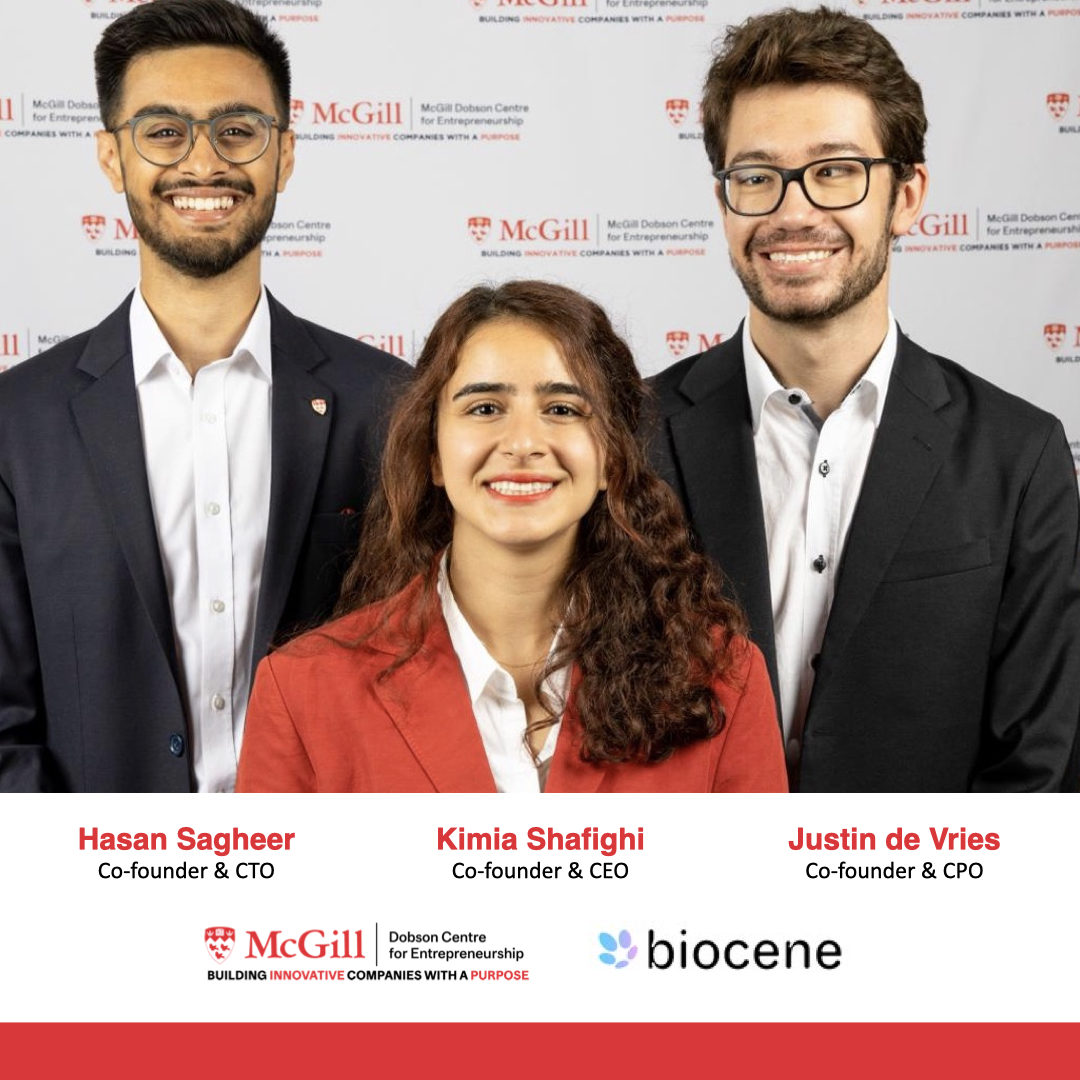Biocene is headed to WCEF in Brussels as part of our International Tour! Check out the interview with co-founders Hasan Sagheer, Kimia Shafighi and Justin de Vries.

What motivated you to start Biocene?
We started as a student project in the McGill BioDesign Team. We came up with an innovative solution to collect harmful excess algae from natural water bodies and transform it into value-added products for sustainable consumption. We won the Public’s Vote Award at McGill’s impact200 competition, then other sustainability innovation challenges and knew that we designed something ground-breaking.
How did the Dobson Centre play a role in Biocene as we know it today?
The Dobson Cup was a way for us to validate that we could turn our project into a startup. The Cup introduced us to a whole new world in business. When we won 3rd place in the environmental enterprise stream, we felt that Biocene could become a reality. However, it was the X-1 Accelerator that gave us the deep dive necessary to really create a company. The pitch coaching was crucial to position ourselves not just as students but as professionals. The Weston Family Innovation in Sustainability Lean Startup program solidified our business plan by showing us how sustainability and business can merge and produce impactful companies.
What are some challenges you have faced or are facing while scaling your startup?
As a Montreal-based startup, an important challenge we have been facing is the seasonal nature of algal blooms. Overgrowths of algae occur in the presence of elevated temperatures, and while climate change is exacerbating their presence, Biocene can only really address the problem during the warmer months. This seasonal limitation has slowed down the validation process for our prototype, as our operations are constrained to specific times of the year.
Another challenge to scaling up our prototype is the required flexibility to meet the diverse needs of different bodies of water, ranging from ponds to beaches and lakes. Adapting our cleantech solution to various environmental contexts adds complexity to the scaling process, requiring us to develop adaptable technologies and strategies to address the unique characteristics of each water body. Overcoming these challenges will be essential for Biocene to expand operations year-round and sustainably remediate algal blooms while transforming them into value-added products.
Who would be your ideal partner for growth?
Although we are focused on the recreation and tourism industries at the moment, we know that our ultimate partner has to be the UN or the Canadian federal government. To have a lasting impact, we want to collaborate with the authorities with the decision-making power to implement our technologies and clean waters on a large scale.
What are you most excited about for WCEF in Brussels?
We’re most excited about the WCEF in Brussels because it provides a unique platform for global leaders, innovators, and stakeholders to come together and collaborate on advancing the circular economy agenda. For Biocene, WCEF offers an opportunity to make connections with global leaders in charge of water management policies. Building these connections is essential for us to implement Biocene's clean tech solution and sustainable water management worldwide.
Additionally, we are excited to collaborate with like-minded organizations and stakeholders who are passionate about driving sustainable change and accelerating the transition to a circular economy. For instance, Biocene can provide algal biomass to companies that utilize bioplastics, contributing to the circular economy by transforming waste materials into valuable resources. By forging strategic partnerships, we can leverage complementary expertise and resources to accelerate the adoption of our technology and scale our operations effectively.
We are also eager to learn from the diverse range of perspectives and experiences represented at WCEF and to gain insights that can inspire and inform our own initiatives and strategies. Overall, I believe WCEF will be a catalyst for fostering collaboration, sparking innovation, and catalyzing tangible progress toward a more sustainable and resilient future.
Biocene Solutions
Biocene Solutions is a cleantech startup based in Montreal. Our flagship product, Algo, is designed to tackle the issue of harmful algal blooms. Algal blooms are overgrowth of algae that can produce toxins and block sunlight from aquatic organisms, effectively creating dead zones in bodies of water. Algo is a device that will remove excess algae from bodies of water without harmful water treatment methods and valorize the collected algae for products such as bioplastics and fertilizer. Our aim is to activate green markets which incentivize the restoration of natural ecosystems, through circular, sustainable consumption of resources. Biocene Solutions was founded by a group of graduate McGill students with a shared desire to leverage bio-inspired solutions for real-world issues.
